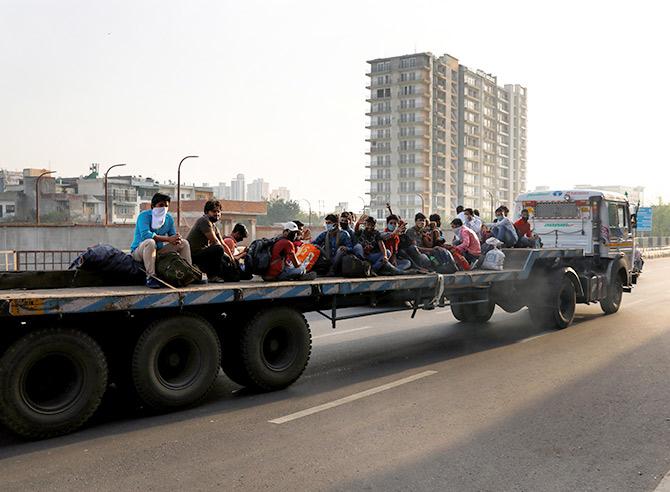The migrants said that they prefer trucks and tempos to go back to their native places as the trucks drop them close to their villages, while buses drop them only till the state border, from where they have to find another mode of transport to reach home.

Even as special Shramik trains and buses are being run by the government to ferry stranded migrant labourers from Maharashtra and other states, most of them still prefer to travel in vehicles like trucks and tempos to return home, flouting the social distancing norms.
The migrants find trucks and tempos convenient, mostly because they drop them close to their home in their respective states, unlike the buses which carry them only till the state border, while the trains ferry them to their home state, from where they have to arrange for vehicles to reach their places.
However, their journey in trucks and tempos is not safe as these vehicles are almost always tightly packed, due to which the risk of contracting COVID-19 infection is higher.
Small tempos carry around 20 persons, while the medium-sized ones can accommodate 25 to 40 people. Small trucks can carry 40 to 60 people, while the larger ones are found carrying up to 100 or even more, with several of them sitting atop.
Sources said that the truckers charge anywhere in the range of Rs 1,500 to Rs 4,500 per person for the journey to Madhya Pradesh, Uttar Pradesh, Bihar and Jharkhand depending upon the distance to their native places from Mumbai and adjoining places.

Several migrant labourers said that vehicle operators charge Rs 1,500-2,000 for MP, Rs 3,000-3,500 for UP and Rs 3,000-4,500 for Bihar.
The migrants said that they prefer trucks and tempos to go back to their native places as the trucks drop them close to their villages, while buses drop them only till the state border, from where they have to find another mode of transport to reach home.
Several of them said that they were forced to undertake journey in vehicles like trucks, as their efforts in seeking permission for Shramik special trains did not get any response.
Umesh Kumar Maurya, a worker from a sweet shop in Maharashtra's Kalyan, who was heading to Lucknow, said, "For the train journey, I had first applied online and later on visited local police station in Kalyan three times. However, I did not get any response and hence decided to take road journey."
After the Centre extended the lockdown, especially for the second time, a large number of migrants started returning home by whatever mode of transport available to them.

A large number of them even started their journey back home on foot.
According to the residents of villages located along the highways, until last week a large number of migrants could be seen walking in groups with their meagre belongings on their head and back.
However, slowly the number of them going on foot started dwindling as most of them are now hiring trucks and tempos.
Mumbai, which is one of the biggest COVID-19 hotspots in the country with over 17,500 cases so far, houses lakhs of migrants.
During a surprise visit on Thursday evening, Maharashtra transport commissioner Shekhar Channe checked a few trucks and tempos on the Mumbai-Agra Highway.
During the inspection at Bhiwandi Phata, he found over 55 migrants crammed inside a truck.
He directed the RTO officials to impound the UP-registered truck that was without any number plate, and take necessary action against the operator.

He also asked the authorities to arrange for free buses for the migrants found inside the truck.
Apart from Shramik special trains being run for the labourers from different cities in Maharashtra, including Mumbai, the state government has arranged free buses to drop them till the state border.
Around 22 migrants are carried in each bus.
According to the Maharashtra State Road Transport Corporation, it has ferried over 1.34 lakh passengers in 10,000 buses till Friday.
Channe said, "RTO officials have been asked to take action against the trucks and tempos illegally carrying migrants. They have also been asked to arrange free buses for the people found travelling in such vehicles."
According to RTO officials, before travelling in trucks and tempos, the migrants do not apply for e-passes, issued for intra-state and inter-state travel. Even the truck operators do not have any permission to ferry them, and hence the entire exercise is illegal.

Sources said that the trucks returning to UP, Bihar, MP and Jharkhand prefer to ferry the migrants instead of running empty and some agents do the booking for the labourers.
From the Mumbai Metropolitan Region, the truck operators pick up the migrants from Majiwade in Thane, Ghodbandar, Mira Bhayander, and many other locations on Mumbai-Agra highway, apart from Anjur phata and Bhiwandi phata.
Small tempos charging Rs 100-500 per person drop the migrants outside Mumbai, from where trucks and tempos pick up these migrants.
Many of them even to walk from Mumbai to these pick-up points.
Sources said that most of the times, the authorities, turn a blind eye towards the trucks and tempos ferrying labourers illegally without following any social distancing norms.










